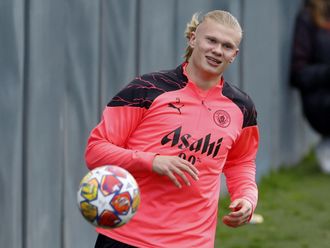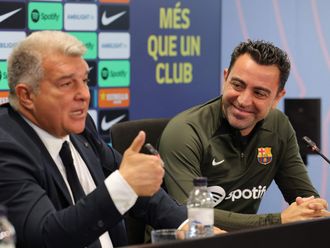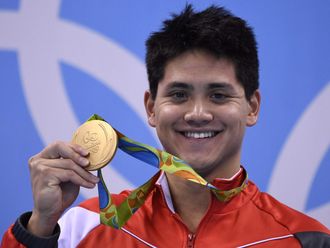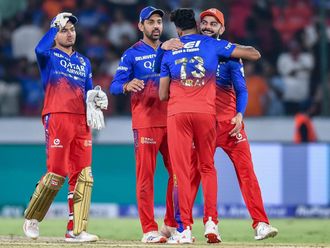Dubai: To the outsider, Pep Guardiola’s got it all.
He’s regarded as a Catalan demi-god, feted and fawned over by Barcelona fans for presiding over the most glorious era in the club’s history.
In four unforgettable years until his resignation at the end of last season, he was the architect behind one of the greatest sides in history, hoovering up an astonishing 14 trophies along the way. His all-conquering juggernaut didn’t just win routinely, they did so playing some of the most sumptuous football ever witnessed.
Aside from the doe-eyed reverence his brilliant team inspired, Guardiola himself was the epitome of charm and charisma. He even succeeded in looking good with no hair.
It’s little wonder, then, given his myriad merits that this jobless genius is the most sought-after coach in world football.
He’s currently on a year-long sabbatical in New York, but is expected to resume football management next summer, according to his biographer Guillem Balague.
It would appear, then, that getting Guardiola — a man with a “privileged brain”, in the eyes of Balague — is the Willy Wonka-esque golden ticket of football, a passport to instant success.
But in his recently published book, Pep Guardiola: Another Way of Winning, Balague says the coveted Catalan’s all-consuming passion for football has been a curse as well as a blessing, his workaholic tendencies often making him angst-ridden and ill.
He told Gulf News: “He has a privileged brain; he has a brain that could have seen him be successful at anything he did. He’s absolutely passionate about the job he does to the point of obsession. Football takes over absolutely everything; his life, his personal life and his health suffers. He puts too much emotional investment, too much physical investment, too much time into it into his work. Near the end of his time at Barcelona, he was taking pills for his health, he had a hernia, all due to not looking after himself. By the end of his time at Barcelona, it looked like he had aged 20 years, having lost his hair etc.”
Balague added that Guardiola would, after flying home from an away game with the team, often go straight to the training ground in the early hours of the morning to watch videos of their next opponents.
He quotes several Barcelona players in the book lauding Guardiola’s painstaking planning and ability to convey tactics, to the extent that his team was able to switch formations several times during a game.
But Balague said such extreme attention to detail and relentless pursuit of perfection — which led to some players calling him enfermo de fútbol (a football freak) — made Guardiola depressed and prone to mood swings.
Balague said: “His moods change very rapidly; he can be either extremely happy or, during buildup to the El Clasico encounters between Barcelona and Real Madrid, someone told me he was like, ‘I can’t handle this anymore, I need to go home’. Then the next morning he sent a message to the same person and said: ‘Actually, forget what I said last night, I am ready for this’.”
While admitting that Guardiola’s time out of the maelstrom of football management will have made him reassess his priorities somewhat, Balague believes his unflagging commitment to his work could result in burnout again.
He added: “Yes, I think he’ll be the kind of coach who will always do three or four years and move on. He’ll be around for a while, and then disappear, because he won’t be able to do it anymore.”
Despite his stratospheric achievements, Guardiola remains insecure and wracked by self-doubt, according to Balague, another reason for his exhaustive and exhausting modus operandi. “Pep certainly didn’t feel good enough [to be Barcelona boss]. One of the top players in England, who I won’t name, sent me a text message after reading the book saying they were shocked to recognise that Pep shared his fear of failure. He told me: ‘I go out on the pitch and think ‘Is this the time when people will see I am not very good? That [fear of failure] was a source of motivation for him and certainly it was for Pep as well.”
It was not a surprise to many that a mentally drained Guardiola turned his back on the pressures of striving to maintain unstinting success last year to take a self-enforced break.
Balague says Guardiola won’t be without his lifeblood of football for long, though, revealing he plans to make a decision on his future in the next few months.
As to where he might go, the journalist, who is a pundit on Sky Sports television’s Spanish football coverage in the UK, said: “I couldn’t bet with Pep because his agent negotiated with Manchester United and then Juventus when he was a player and he ended up playing for [Italian club] Brescia.”
Balague believes Manchester United and Arsenal are not likely destinations for the venerated coach because their managers, Sir Alex Ferguson and Arsene Wenger, “are unlikely to retire anytime soon”.
Otherwise, Chelsea’s rapid turnover of managers has not helped their cause in Guardiola’s eyes, he feels, and Balague also questions whether the Spaniard would feel comfortable working under such a ruthless and omnipotent owner as Roman Abramovich.
Balague added: “Elsewhere in England, you’re left with Manchester City basically and his friends [Director of football Txiki Begiristain and Ferran Soriano, Chief Executive, both former Barcelona officials], are there and it looks like the manager [Roberto Mancini] may go [this season], so there are a lot of reasons to suggest they are favourites [for his signature].”
However, according to Balague, Bayern Munich and AC Milan should not be ruled out as potential winners of the frenzied race to get Guardiola.
“He also loves Italy; he’d love to be the manager of Brescia, a club he played for, at some point,” he said.
Balague concedes Guardiola might not be an “automatic success” were he to end up in England. But he is convinced that a man of his immense talent would eventually succeed, insisting he has “a football eye I haven’t seen anywhere else, apart from in Rafa Benitez or Jose Mourinho”.












